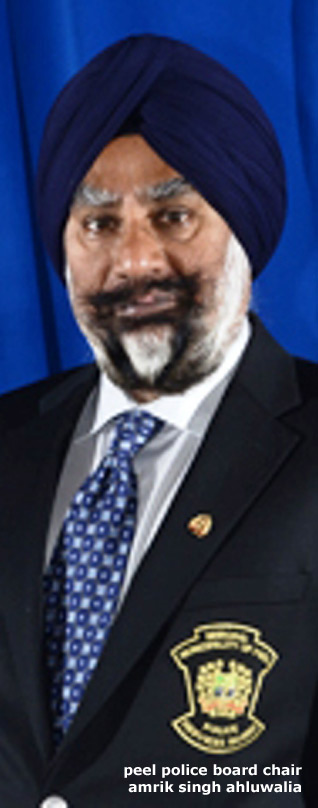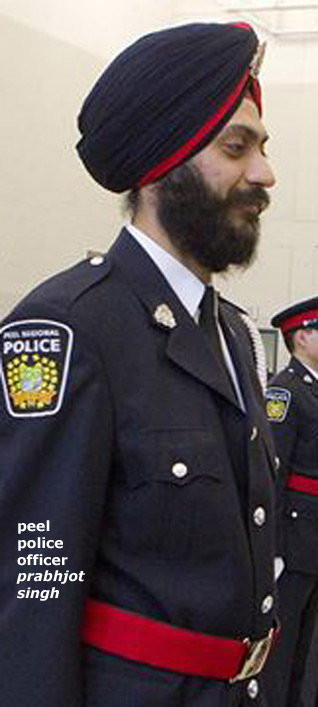People
New Police Board Chair Wants To Make His Force An ‘Example To The Rest Of The World’:
Peel Police Force
SAN SINGH GREWAL, et al
Peel, Greater Toronto Area, Ontario, Canada
A Sikh-Canadian has been unanimously elected as the head of Canada’s Peel Police, the country’s third largest municipal police force.
Sardar Amrik Singh Ahluwalia was voted as the new chair of Ontario’s Peel Police Services Board after receiving backing from Brampton Mayor Linda Jeffrey and Mississauga Mayor Bonnie Crombie.
“My first thoughts are, what a wonderful country we live in,” Amrik Singh said, immediately after the unanimous vote on January 29, 2016.
Noting that he arrived in Canada decades ago “with $7 in my pocket”, Amrik Singh said he couldn’t have fathomed at the time that one day he would be bestowed with this honour and responsibility.
“I am honoured. This is a great responsibility I take with humility and with a sense of purpose that I want to do my very best,” he said, adding that the Board and the Force would work to improve things “collaboratively”.
“I will do my best to serve the public and serve the police force ... the men and women in the force who day in and day out do such an exemplary job,” he said.
Amrik Singh was first appointed by the Ontario government as a member of the Board in February 2011 and re-appointed for a second term in April 2014.
A business leader with extensive background in manufacturing and petrochemicals, Amrik Singh has organised several youth camps and served as president of Sikh Society, Calgary.
The Peel Regional Police is Canada’s third largest municipal police force, responsible for the provision of adequate and effective police services, law enforcement and crime prevention within the region, a duty it discharges through the enactment of policies.
The board is responsible for the police budget, oversees the actions of the Chief of Police and is the employer for the members of the police service.
* * * * *
The new Peel Police Services Board chair has bold plans for the third largest municipal force in Canada. Critics are calling for a major overhaul as the force faces scrutiny over police misconduct and its failure to reflect the diversity of one of Canada’s most multicultural regions which also boasts a substantial Sikh-Canadian population.
Question (by San Grewal): What are the unique challenges of policing in the Greater Toronto Area (“GTA”), with its dramatically changing demographics? In Mississauga and Brampton, about two-thirds of the population is from visible minority groups, the majority within the latter comprising Sikh-Canadians.
Answer (Amrik Singh): Peel is even more diverse than Toronto and the rest of the GTA. This is our challenge, and this is an opportunity. There’s the issue of language and culture. There is also the issue of people’s perception of police not being your friend, people who have lived in countries where the police (are) not seen in a positive way. The best way to deal with that is, we should reflect the population. Whatever we’re doing, the chief and the management is working very hard, but we need to put it in higher gear. Training is key -- cultural sensitivity training. We are doing it.”
Q: Why has it taken police and the board so long to act on racial profiling and random street checks?
A: Large organizations, not only the police, are slow. They sometimes lag behind what the accepted norms are and what the expectations are. I can tell you, the expectation of the public today is a lot higher than it was 10 or 20 years ago. We (Mississauga and Brampton) are 61 per cent minorities now; that’s not a minority anymore, it’s a majority. This is a very dramatic shift. So, I think we were left behind with where things are going and what the issues are.
But I’m so glad that we have started to address it now. Just to highlight how complex this issue is, when we voted on it (to ban street checks/carding in September) it passed by a very slight margin, four to three. That means that it wasn’t only with the police we had a different point of view, but within the board we had a different point of view. I’m hoping by persuasion, by conversation, we can change that -- and I can ensure you that in a year from now the conversation should be different. I’ll be disappointed if it isn’t.
Q: The province has announced it is banning random carding and bringing in new rules. Chief Jennifer Evans refused your board’s request to stop carding. What will you do if the force doesn’t follow the rules or future instructions from the board?
A: We have a really qualified police force. Notwithstanding one or two issues, on a vast number of issues the chief and I and the board are congruent -- not on everything. Having said that, these are professionals; they will follow what the regulation is. Whatever the regulation is passed by the Ontario government, these people will follow. I have no doubt about that.”
Q: Do you support body cameras on officers?
A: I think it’s something we need to really study. I think there is a lot of value in these body cameras because it helps with trust. I think there is a lot of distrust. You see what is particularly happening south of the border (in the United States).
Q: Many police officers across North America are saying they’re being turned into the bad guys, and they fear that if officers become scared to do their jobs for fear of reprisal, crime will rise. How do you balance police accountability with the need to let them do their jobs?
A: Look, our police people are professionals. They know the expectations of them and that the expectations are changing, and in general, rising. We have better-educated recruits coming in. If you look at the recruits coming in today, such a high percentage have graduated from college or university. If you looked at recruits 20, 30 years ago, none of them (had education beyond high school).
This is a far cry from when a Grade 12 education was sufficient. Not any more -- the competition is so high. People coming in are smarter. But also, most people in the force are professionals; they want to do a great job.”
Q: How does your background help you in your new role?
A: I’m very bullish on this country, and I think I said in the meeting, you know, an immigrant boy comes to this country with $7 in his pocket and then he’s later interested in being the chair of the police board, and is voted in unanimously -- it’s mind blowing. That’s the country we are in. That’s why I’m so proud to be Canadian and my kids are so proud to be Canadians, because this is a fantastic country that we live in.
And that’s why I decided to be on the police board. I have fought the odds. I faced obstacles, but now my kids have fewer and fewer obstacles. I want to pay back to the society. I’m going to do my best to make this police force be the best, to use diversity as an opportunity to show people how we can manage things better, to be an example to the rest of the world.”
[Courtesy: The Toronto Star, The Hindustan Times. Edited for sikhchic.com]
February 3, 2016
Conversation about this article
1: Sangat Singh (Kuala Lumpur, Malaysia), February 03, 2016, 8:08 PM.
"Kaho Naanak sabh tayree vadia-aa-ee ko-ee naa-o na jaaanay mayraa" [GGS:38.312] - "Says Nanak, this is all your greatness, no one even knows my name."
2: Roop Dhillon (London, United Kingdom), February 05, 2016, 5:00 PM.
Sikhs are doing exceptionally well in Canada ... they must be really p***ed off in India (the right wing Hindu 'rest of India' element, I mean).
3: RP Singh (Chandigarh, Punjab ), February 06, 2016, 2:38 AM.
Admirable.




